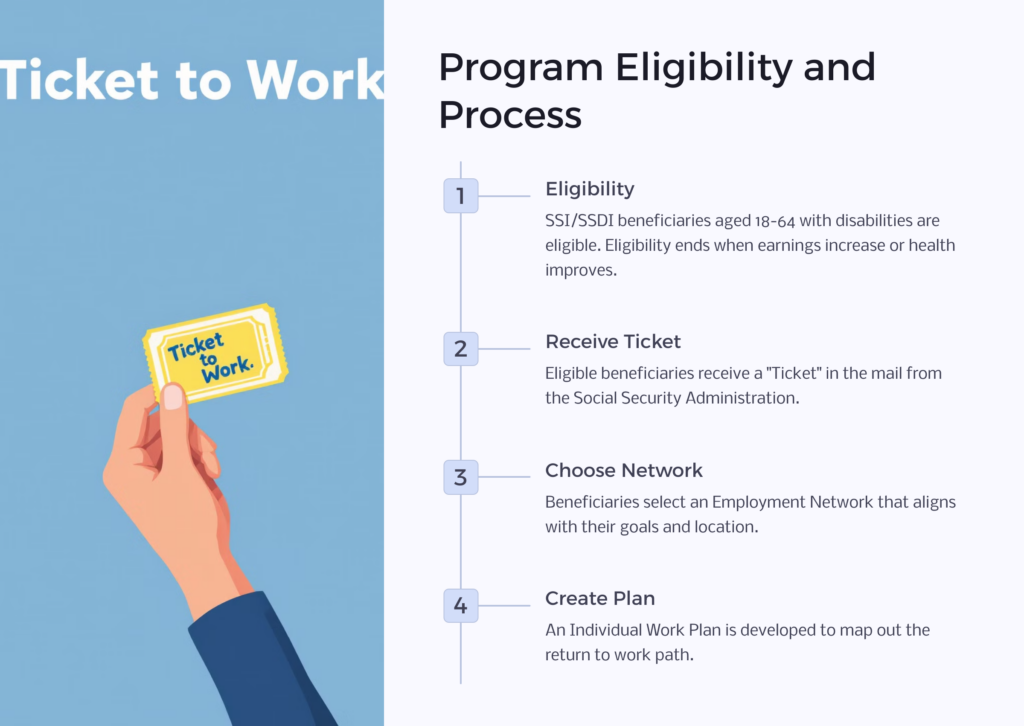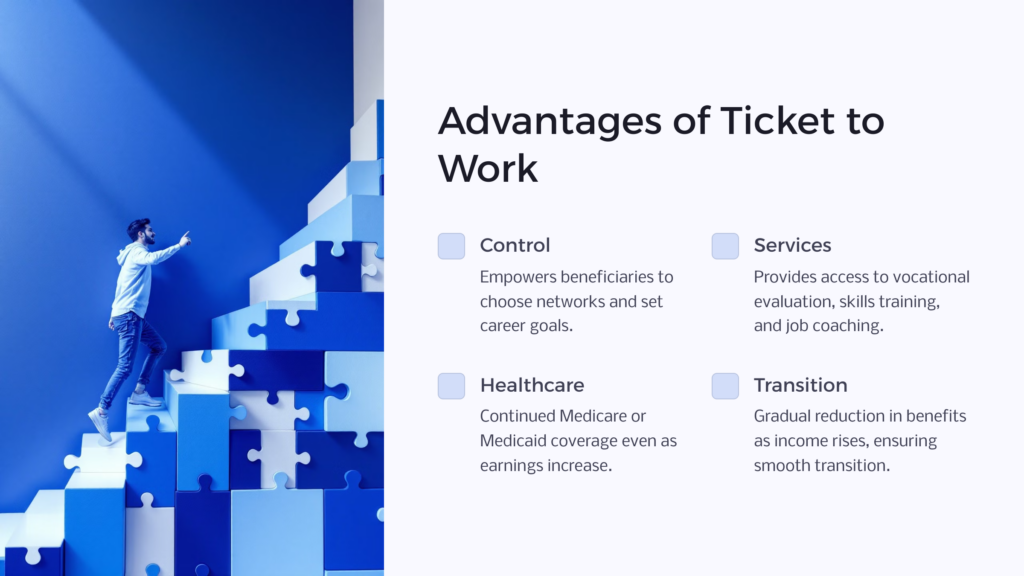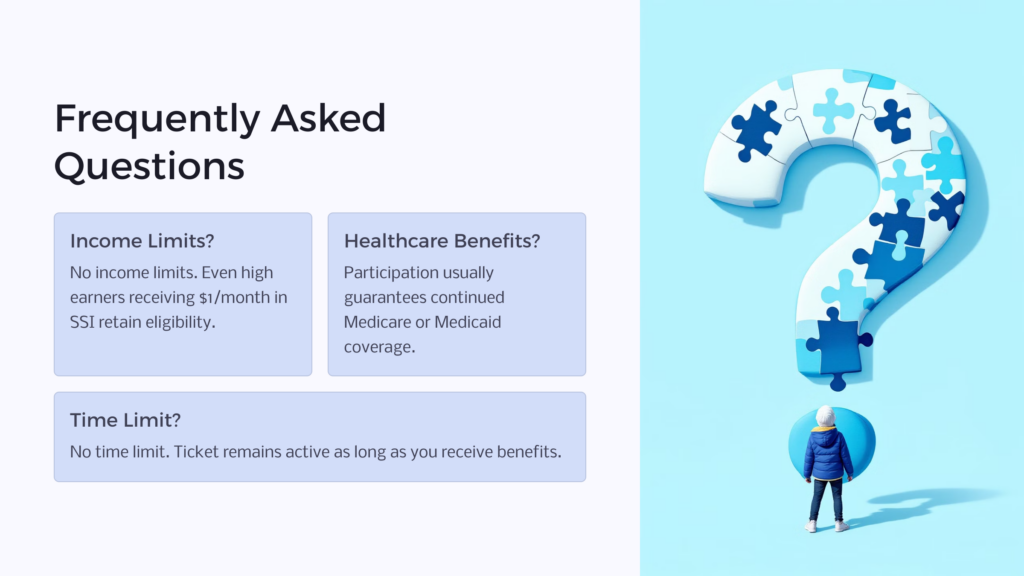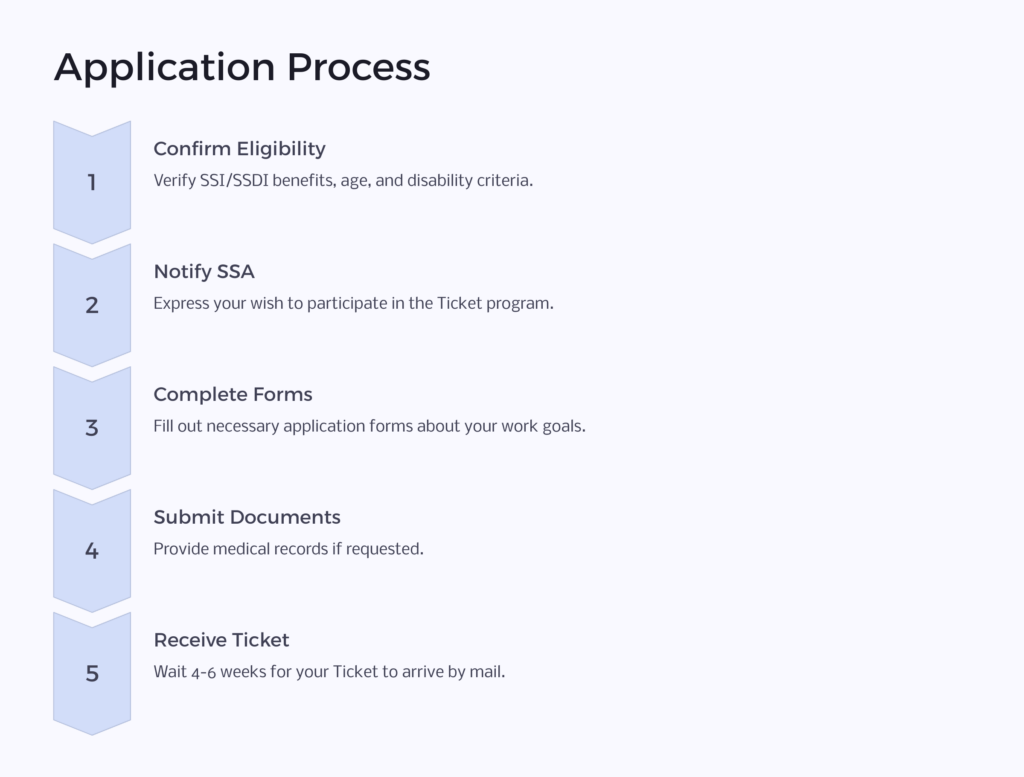
The Ticket to Work and Self-Sufficiency Program (AKA Ticket to Work) is a branch of Social Security that helps beneficiaries of Supplemental Security Income (SSI) and Social Security Disability Insurance (SSDI) find employment opportunities, increasing self-sufficiency and fulfillment. For Social Security beneficiaries who a) have disabilities, and b) are aged 18 to 64. The program was created under the Ticket to Work and Work Incentives Improvement Act of 1999 (P.L. 106-170). Under the program, disabled beneficiaries can access employment and career-building services from authorized service providers known as Employment Networks.
SSI/SSDI beneficiaries are usually eligible until increased earnings phase out their Social Security benefits, or until their health improves and they’re no longer disabled under Social Security guidelines. Eligibility may also end if they fail to make timely progress in pursuing the return to work goal.
How Does the Ticket to Work Program Work?
The step-by-step process looks like this:
- You receive a “Ticket” in the mail once the Social Security Administration determines that you meet the eligibility criteria.
- You choose an Employment Network that serves your area and provides services suited to your employment goals.
- You and your Employment Network complete an Individual Work Plan that maps out your return to work path.
- You begin receiving employment services and support according to the Individual Work Plan.
- Once you start working and earning wages, you notify the SSA, and your disability benefits are adjusted accordingly.
- You continue working with your Employment Network and the SSA to manage your Social Security benefits as your earnings fluctuate.
The Social Security Administration handles eligibility determinations, issues Tickets, adjusts disability benefits, tracks beneficiaries’ progress, and also recruits, trains, and supports the Employment Networks.
Advantages of the Ticket to Work Program

The Ticket to Work program offers several invaluable advantages to disabled Social Security beneficiaries seeking employment opportunities:
More Control Over the Return to Work Process
The Ticket program empowers beneficiaries to choose their own Employment Networks, set their own career goals, and get personalized services tailored to their individual needs. This gives disabled individuals much more control over their job placement and return to work process.
Wide Range of Vocational Services
Depending on the Employment Network you choose, beneficiaries can access a whole range of employment resources including vocational evaluation, skills training, education, job coaching, resume writing, and interview preparation.
Continued Healthcare Support
Even when earnings are high enough to phase out cash benefit payments, most beneficiaries who participate in the Ticket program retain eligibility for Medicare or Medicaid health insurance coverage. This continued health protection makes career advancement less risky.
Gradually Transition Off Benefits
As wages and other earned income rise, Social Security Disability Insurance and Supplemental Security Income payments gradually decline through a carefully calculated formula, creating a smooth transition period instead of an abrupt loss of income.
No Time Limit
There is no time limit on using a Ticket and returning to work at your own pace. Tickets remain valid until employment and earned income are high enough to completely eliminate disability services and payments.
Possible Challenges with the Ticket to Work Program
While the many advantages are numerous, some beneficiaries do face challenges when using a ticket to return to work. Understanding these obstacles is essential so they can be properly addressed and overcome.
Health Issues Resurfacing
For some disabled individuals trying to return to work, existing medical issues may recur or new ones may arise. Flare-ups can force them to take time off and/or reduce hours, making substantial gainful activity harder to achieve.
Overpayments
Another complication happens if you don’t record or report changes in work status. This can sometimes result in benefit overpayments that must later be repaid. Knowledge of the reporting rules and maintaining frequent contact with SSA caseworkers greatly reduces overpayment occurrences.
Work Incentives Expiring
Disabled beneficiaries who participate in the Ticket program take advantage of various work incentives that allow them to retain cash benefit and healthcare coverage while working. However, some of these incentives do expire after several years. Losing these protections can increase anxiety about losing benefits altogether. Proper planning for when incentives run out is key to a smooth transition period.
Here are some solutions and advice for dealing with the above challenges:
- Maintain comprehensive health insurance through private carriers or public options even when Medicare/Medicaid coverage expires
- Build up a cash safety net by saving a portion of each paycheck as rainy-day reserves
- Check in regularly with SSA caseworkers and Employment Network counselors about work incentive timelines
- Research state and local service programs that assist disabled citizens in transitioning to independence
FAQ

What are the program’s income limits?
There are technically no income limits. Beneficiaries at all earning levels can use a Ticket to obtain service. Even very high earners receiving just $1 per month in SSI cash benefits retain full Ticket eligibility.
Can I lose my healthcare benefits because of the Ticket program?
In most cases, participation in the Ticket program guarantees the continuation of your healthcare coverage through Medicare or Medicaid, even if your cash benefits phase down to $0 because your work earnings increased substantially.
Is there a time limit for using my Ticket?
No, your Ticket remains active and valid for as long as you receive Social Security disability benefits and are making timely progress in pursuing your personalized return to work plan.
Can I receive other vocational rehabilitation services in my state in addition to the Ticket program?
Yes, using your Ticket does not impact eligibility for other rehabilitation and employment support programs and disability services offered through state agencies, nonprofit organizations, or even private service provider companies. The services simply need to complement each other.
What if an Employment Network no longer wishes to work with me?
You have the right to take your Ticket and assign it to another Employment Network more suited to your needs. As long as you still meet the disability criteria under Social Security guidelines, your Ticket always remains valid.
Can family members use my Ticket if I’m medically unable to work?
No, Tickets are only issued directly to eligible Social Security disability beneficiaries. The services are tailored specifically for assisting the disabled individual participant in finding employment opportunities.
How to Apply for the Ticket to Work Program

Applying for the Ticket to Work program is straightforward. Here is an outline of the application process:
- Confirm your eligibility by verifying that you receive SSI or SSDI benefits, are between the ages of 18 and 64, and meet Social Security’s disability criteria
- Notify a Social Security Administration representative that you wish to participate in the Ticket program
- Complete any necessary application forms or questionnaires about your work goals
- Submit medical records or physician reports if requested to establish current health status
- Provide updated contact information including mailing address and phone number
- Wait 4-6 weeks to receive your Ticket by mail with instructions on next steps
Remember, participation is completely voluntary but does provide valuable incentives and protections. Once active in the program, you must make timely progress on your return to work plan or risk Ticket suspension. Tickets can be easily reactivated however by simply notifying the SSA.
Role of Employment Networks in the Ticket to Work Program
Authorized Employment Networks (ENs) play a pivotal role in guiding beneficiaries through their return to work journey under the Ticket program.
Employment Networks have extensive knowledge regarding Social Security disability benefits rules. They understand how increases in wages impact your cash payments and healthcare coverage. Most importantly, ENs provide access to vocational rehabilitation experts, career counselors, skills trainers, and job developers.
Your Authorized Employment Network helps assess your current skills and interests, find good employment goals, and then map out steps to reach those goals. This guidance combined with ongoing employment support and job placement assistance has proven invaluable for hundreds of thousands of Social Security beneficiaries working towards financial independence.
As your earnings grow over time and reliance on disability benefits slowly declines, your EN will continue to check in on your progress. They will help ensure that incentives are used properly, healthcare coverage continues, and any potential issues with benefits or payments are addressed promptly. Using your EN will smooth out the process and get you on the right path.
 Benefits.com Advisors
Benefits.com Advisors
With expertise spanning local, state, and federal benefit programs, our team is dedicated to guiding individuals towards the perfect program tailored to their unique circumstances.
Rise to the top with Peak Benefits!
Join our Peak Benefits Newsletter for the latest news, resources, and offers on all things government benefits.




















